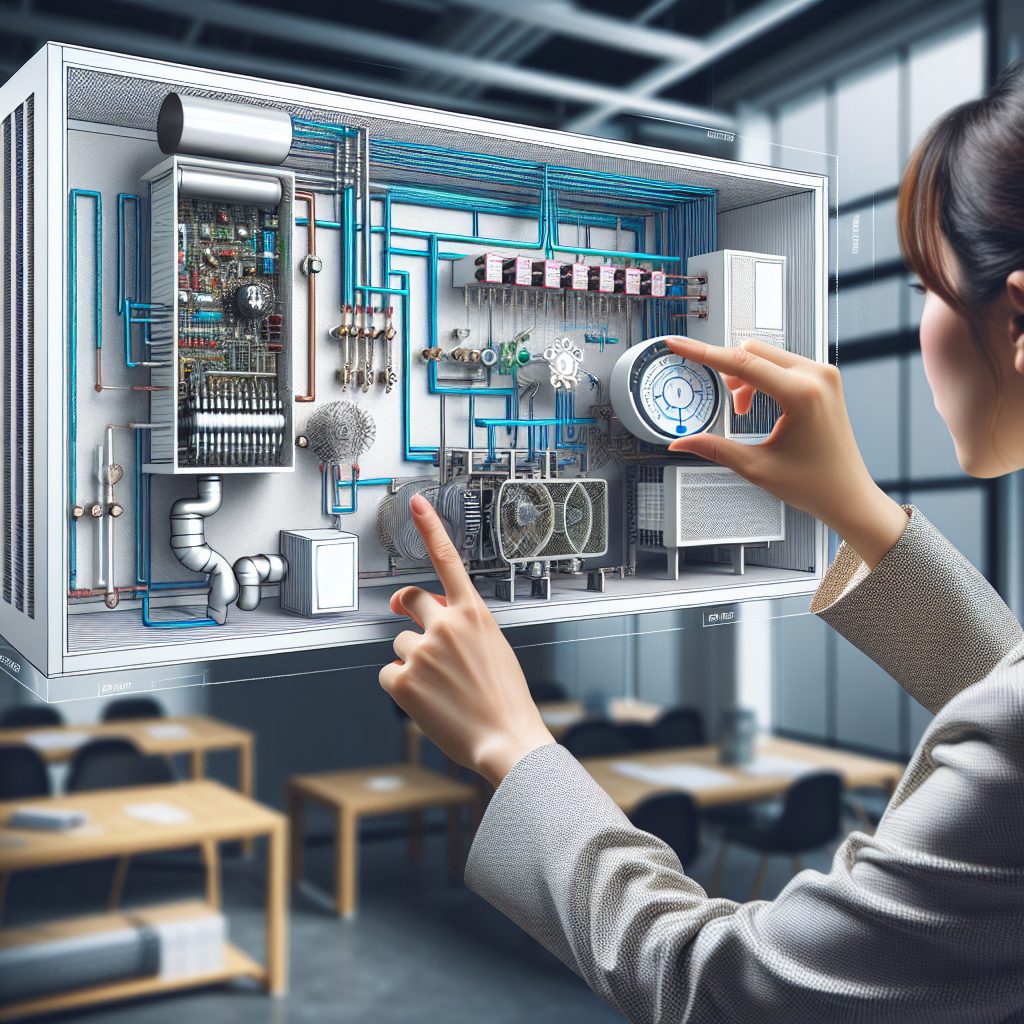
Humidity control is a vital part of modern HVAC systems. A properly functioning HVAC system ensures a comfortable and healthy living environment by controlling the amount of moisture in the air. The level of humidity can have a significant effect on indoor air quality, comfort, and energy efficiency. Humidity control involves the implementation of processes to either increase or decrease the level of humidity in the home in order to provide a comfortable living environment. Additionally, having appropriate humidity control can prevent the growth of mold and other allergens, and can help increase energy efficiency by allowing the air in the home to move more freely.
One of the key components of effective humidity control in HVAC systems is the capacity of the system to accurately measure and respond to changes in the level of humidity. This is typically accomplished through the use of special sensors placed in strategic locations in the home. This allows the system to make appropriate adjustments to the amount of moisture in the air in order to achieve the desired humidity level. Additionally, the use of filters and other mechanisms to reduce the amount of dust particles in the air can further help to maintain the desired level of comfort. In the next part of this article, we will be discussing some tips on how to ensure the proper functioning of humidity control in HVAC systems.
Key Takeaways
1. Achieving the desired humidity level in any space is essential to creating a comfortable environment for people, and is one of the main goals of HVAC systems.
2. There are various types of HVAC systems and different types of humidity control processes available.
3. Improper humidity control can lead to a host of problems, including the growth of mold and bacteria, and even decreased air quality.
4. In order to keep indoor spaces at the optimal humidity level, it is important to have the correct humidity control installed in the HVAC systems.
5. Proper maintenance and regular inspection of HVAC systems is a key factor in maintaining the correct humidity level and a comfortable environment.
What is the Purpose of Humidity Control in HVAC Systems?
HVAC systems are designed to maintain the air quality in an enclosed space by regulating the air temperature, ventilation, and humidity levels in an enclosed space. Humidity control is an essential component of the HVAC system as it helps maintain healthy air quality, assists in thermal comfort, and provides organic mold and bacteria growth prevention.
How Does a Humidity Control Work?
Humidity control systems are composed of two separate parts – the humidifier, which adds moisture to the air, and the dehumidifier, which takes away excess humidity.
Humidifiers raise the relative humidity by evaporating water molecules from a water basin into the air, whereas dehumidifiers use refrigeration to cool the warm air that enters in it. As it cools, the relative humidity is condensed, draining unwanted moisture in to the water basin.
How is Humidity Controlled in HVAC Systems?
Humidity in a HVAC system can be controlled in three ways: manually, via an automatic system, or through custom components.
Manual Control
Manual control of humidity requires the user to constantly monitor and adjust the setting on the humidity control. This is the most labor-intensive and least energy-efficient option, but is often the least expensive way to get a system up and running.
Automatic Control
Automatic systems allow the user to set their desired humidity levels and then the system will regulate those levels without any user intervention. This is the most common option as it is easy-to-use and cost-efficient.
Custom Components
The last option is custom components. This is used in larger, more complex systems that require customization.
What is the Ideal Humidity Level for HVAC Systems?
Finding the right balance for humidity in a HVAC system is key to ensuring proper function and comfort for the building’s occupants. Generally, the ideal humidity level for most HVAC systems is between 40-60% relative humidity. This will ensure that the air is not too dry or too wet, offering a level of comfort for the occupants.
What Are the Benefits of Having Humidity Control in HVAC Systems?
1. Maintaining Healthy Air Quality: The main benefit of having humidity control in an HVAC system is that it helps to maintain healthy air quality by providing clean and breathable air. This is because when the air isn’t too dry or too wet, the air is free of harmful allergens and dust.
2. Assisting in Thermal Comfort: Proper humidity control in HVAC Systems also assists in thermal comfort. When the air is too dry, discomfort can arise, but when the air is properly humidified, it feels more comfortable.
3. Prevent Organic Mold and Bacteria Growth: By controlling the humidity levels, it can prevent organic mold and bacteria growth in the HVAC system, which is especially important in buildings with a lot of organic spend like medical facilities.
What Are Some Tips to Improve Humidity Control in HVAC Systems?
1. Update or Replace the Filters: The first tip to improve humidity control in HVAC systems is to update or replace the filters. This helps to ensure that the air being circulated is not only clean, but also has the right humidity levels.
2. Install Humidity Sensors: Install humidity sensors throughout the HVAC system to help monitor and adjust the relative humidity levels.
3. Maintain the HVAC System: To ensure the HVAC system is running as efficiently as possible, it’s important to regularly maintain the system. This includes checking all the components, cleaning out any built up dust or debris, and ensuring everything is working as it should be.
4. Ensure Adequate Ventilation: Make sure the HVAC system has adequate ventilation, as this will help regulate air flow and humidity levels.
5. Use a Humidifier/Dehumidifier: Use a humidifier/dehumidifier to control the humidity levels in the system. The humidifier can add moisture to the air when necessary, and the dehumidifier will take away excess moisture when it gets too high.
What Are the Best Practices for Improving Humidity Control in HVAC Systems?
1. Install Humidity Sensors: Install humidity sensors throughout the HVAC system to help monitor and adjust the relative humidity levels.
2. Clean or Replace Filters: Inspect and clean or replace the filters as needed to ensure the air is free of allergens and dust, while also providing the right humidity levels for the occupants.
3. Properly Maintain the HVAC System: Perform regular maintenance checks to ensure all components are in good working order and the system is running optimally.
4. Adequate Ventilation: Make sure the ventilation of the HVAC system is adequate so it can properly regulate air flow and humidity.
5. Implement Humidifier/Dehumidifier: Consider installing a humidifier/dehumidifier to further control the humidity levels and ensure the air is neither too dry nor too wet.
Questions:
What is humidity control?
Humidity control is the act of maintaining the levels of moisture in the air to create a comfortable and healthy living environment. This is usually achieved by using devices on a heating, ventilation, and air conditioning (HVAC) system that removes moisture from the air.
What are the benefits of humidity control in HVAC systems?
Humidity control in HVAC systems is important for a comfortable and healthy living environment. Humidity control helps maintain the air’s moisture content, which keeps the air from feeling unnecessarily dry. By maintaining the humidity levels in a room, you can experience improved air quality, which can help reduce health problems caused by allergies or asthma. Additionally, humidity control can help reduce energy consumption, as a higher humidity level will reduce the amount of energy lost through air conditioning.
How does humidity control work in HVAC systems?
Humidity control works by controlling the air flow and temperature within the home. By controlling these two variables simultaneously, HVAC systems can reach ideal humidity levels, which will keep the air from feeling too damp or too dry. This process is usually done using a device called a dehumidifier or humidifier, which are built into many modern HVAC systems.
What humidity levels should an HVAC system aim for?
An ideal humidity level for a home is between 30-50%. This range of humidity is comfortable while ensuring there is no excessive moisture buildup. This range is achieved by regulating the temperature and air flow correctly on the HVAC system.
What type of system should be used to regulate humidity?
The best type of system for controlling humidity is an HVAC system that uses a combination of air conditioning and heat pumps. The air conditioning will cool the air, while the heat pumps will warm the air. This combination will allow for controlled temperature and air flow. Additionally, a humidifier or dehumidifier can be installed in the HVAC system to independently control the humidity levels.
Are there any health benefits of humidity control?
Yes, properly controlling the humidity levels in a home can be beneficial for health. Controlling the humidity levels in a home can reduce the growth of harmful bacteria and dust mites, which can cause asthma and other medical issues. Additionally, a comfortable level of humidity can reduce the risk of colds and other illnesses.
What pitfalls should be avoided with humidity control?
The main risk when controlling humidity levels is running the system too dry. If the humidity levels are too low, it can cause discomfort such as dry skin and irritated eyes. Additionally, constantly running the system in dry mode can cause the air to become overly dry, which can lead to the growth of bacteria and other unwanted particles.
Are there any other maintenance tasks related to humidity control?
In addition to setting the correct humidity levels, regular maintenance should be performed to ensure the system is working properly. This includes checking the air filters, cleaning registers and grilles, and checking for any leaks or blockages in the ductwork. Additionally, the humidifier or dehumidifier should be serviced regularly to ensure they are working as intended.
What are the energy-saving benefits of humidity control?
One of the main benefits of humidity control is reducing energy consumption. Properly controlling the humidity levels in a home can reduce the use of air conditioning, which can help lower heating and cooling bills. Additionally, controlling the humidity levels helps create an optimal indoor climate, which can help reduce energy losses during warm or cold days.
What other tips should be followed for effective humidity control?
For optimal humidity control, the system should be programmed to maintain a specific humidity level. Additionally, the air filters should be replaced regularly to ensure proper air flow, and the registers and grilles should be vacuumed or blown out to reduce the amount of dust buildup. Keeping the system in good condition can help achieve the desired humidity levels and reduce energy consumption.
Final Thoughts
Humidity control is an important part of maintaining a comfortable and healthy living environment. Properly controlling the humidity levels in a home can be beneficial for health, provide comfort, and reduce energy consumption. When looking to regulate the humidity in a home, an HVAC system with a built-in humidifier or dehumidifier is the best way to achieve the desired levels of moisture. Additionally, regular maintenance should be performed to ensure the system is working properly and to reduce energy consumption.
Humidity control is an important part of a home’s overall comfort and health, and by following the right steps, you can ensure your home always has the optimal humidity levels. With the right system in place, you can create a comfortable living environment for you and your family.



